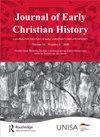Military Manuals, Masculinity, and the Making of Christian Soldiers in Late Antiquity
IF 0.1
0 RELIGION
引用次数: 0
Abstract
Abstract As Christianity was adopted as the religion of the Empire over the course of the fourth and subsequent centuries, texts about military training began gradually to articulate more forcefully the idea that Christianity was the religion of the state and that it should be protected by force of arms. Yet the army also played a significant role as an institution within which Christian men were formed in the late Roman and early Byzantine empires. This article explores the intersection of military training and Christianity in the late Roman and early Byzantine military. It examines the largely untapped evidence that late antique military manuals provide for the role of Christian praxis in the making of two kinds of military men: first, the generals to whom such manuals were directed; second, the soldiers that they were meant to lead and on whose training the manuals focus much of their attention. The military manuals articulate a clear and evolving vision, heavily influenced by precedent, of how men were to be formed into ideal Christian soldier-subjects who were proficient soldiers and able to keep God on their side in order to prosecute Christian warfare. The manuals provide a model for the formation of hyper-masculine Christian subjects who were able simultaneously to make their subordinates submit to their authority and to act submissively to their superiors, especially the emperor and his generals.军事手册、男子气概与古代晚期基督教士兵的塑造
摘要随着基督教在第四个世纪和随后的几个世纪被采纳为帝国的宗教,关于军事训练的文本开始逐渐更加有力地阐明基督教是国家的宗教,应该受到武力的保护。然而,在罗马帝国晚期和拜占庭帝国早期,军队作为一个形成基督徒的机构也发挥了重要作用。本文探讨了罗马晚期和拜占庭早期军事训练与基督教的交叉。它研究了大量未开发的证据,即晚期古代军事手册提供了基督教实践在培养两种军人中的作用:首先,这些手册所针对的将军;第二,他们本应领导的士兵,以及手册所关注的训练对象。军事手册阐明了一个清晰而不断发展的愿景,该愿景深受先例的影响,即如何将人们培养成理想的基督教士兵主体,他们是熟练的士兵,能够让上帝站在他们一边,以进行基督教战争。这些手册为形成超男性化的基督教臣民提供了一个模式,他们能够同时让下属服从他们的权威,并顺从上级,尤其是皇帝和他的将军。
本文章由计算机程序翻译,如有差异,请以英文原文为准。
求助全文
约1分钟内获得全文
求助全文

 求助内容:
求助内容: 应助结果提醒方式:
应助结果提醒方式:


